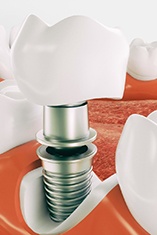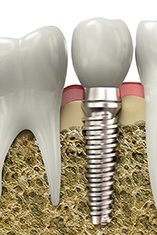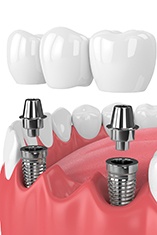Dental Implants — Park Slope, NY
Rebuild a Beautiful, Functional Smile

The latest innovations in dentistry make it possible to preserve natural teeth for longer than ever. Unfortunately, tooth loss is still a problem. Conventional dental prosthetics are effective; however, they only replace the portion of the tooth visible above the gum line. As an alternative, you can choose dental implants in Park Slope, which recreate the entire tooth structure from the root up. This allows you to enjoy a close replica of your natural smile that can last for a lifetime. To learn more about dental implants, give The Dental Spa of New York a call!
Why Choose The Dental Spa of New York for Dental Implants?
- Works with Top Local Dental Implant Specialists
- Highly Personalized Restorations for All Levels of Tooth Loss
- Modern Technology and Flexible Financing Available
What Are Dental Implants?

Dental implants are the only method of tooth replacement that work to mimic the tooth root in every way possible, ensuring true longevity for your missing tooth or teeth. The titanium post integrates with natural bone tissue similar to that of other implants, such as hip or knee replacements. Once the implant has fully healed, a crown, bridge, or denture can be attached and make your smile complete! You can have confidence knowing your oral health is protected from the many side effects that come with tooth loss and eat all your favorite foods without worry.
The 4-Step Dental Implant Process

The process of rebuilding your smile with dental implants will take several steps to complete. As you’ll soon find out, though, the unmatched longevity and reliability that they provide makes dental implants well worth the wait! Our office works with the most qualified professionals in our network for each step in your treatment plan. While the details of the process can vary a bit from one patient to the next, here is a basic outline of how dental implants work in Park Slope.
Initial Dental Implant Consultation

The dental implant process begins with an initial consultation, during which Dr. Sapienza will evaluate your oral health to ensure you’re a candidate for dental implants. This will also involve reviewing a CT scan to look for any potential complications. Based on the results, you might need additional procedures before moving forward, like tooth extractions or periodontal therapy, to increase the chances that your treatment will be successful. At this consultation, Dr. Sapienza will go over an estimated timeline for your treatment. You’ll also have an opportunity to ask him any questions you may have.
Dental Implant Surgery

Once your mouth is ready to support dental implants, we’ll help you schedule your placement surgery. Dr. Sapienza works closely with local specialists to ensure that you’re receiving the highest quality care possible.
Your implant dentist in Park Slope will help you feel comfortable by numbing your mouth and administering sedation before making small incisions in your gums. Then, your implants are inserted into the jawbone at precise locations and angles. Protective caps are placed atop the implants, and you are sent home to begin the healing process.
Dental Implant Osseointegration & Abutment

Over the next four to six months, your implant posts will actually fuse to the surrounding bone and tissue through a process called osseointegration. Although osseointegration takes a while to complete, the end result is a sturdy, lasting foundation for your new teeth. During this time, you will most likely receive a “temporary” restoration so that you won’t have to go without teeth any longer.
After osseointegration, the oral surgeon will attach metal fixtures called abutments on top of your implants. These connectors are what will allow Dr. Sapienza to secure your new teeth in place.
Delivery of Dental Implant Restoration(s)

Once you have finished healing from your abutment placement, your dental implants in Park Slope should be ready to support your restoration. You’ll return to our office to have your custom dental crown, bridge, or denture attached to your implants. Thanks to the materials we use, your new pearly whites should look extremely lifelike. In fact, other people shouldn’t even be able to tell that they’re not your “real” teeth!
Benefits of Dental Implants

Dental implants are swiftly becoming one of the most popular tooth replacement options with over 500,000 people choosing them each year. Because they can rebuild the entire tooth structure due to their unique placement in the jaw, they allow you to experience an amazing variety of advantages that you won’t be able to get with other options. Read on below to learn about some of the life-changing benefits of dental implants in Park Slope.
Day-to-Day Benefits

Health Benefits

Long-Term Benefits

Who Dental Implants Can Help

A dental implant is comprised of 3 parts: an implant post, an abutment, and a restoration. Depending on the number of teeth you’re replacing, your treatment plan will vary slightly.
Who Is a Good Candidate for Dental Implants?

The only way to definitively know if dental implants are right for you is to see us for a consultation, where Dr. Sapienza will examine your mouth before making any recommendations. However, good dental implant candidates usually:
- Are committed to diligent at-home oral hygiene
- Are missing at least one tooth
- Have a strong enough jawbone to accommodate implants (or be willing to undergo a bone graft first)
- Do not use tobacco products
Missing One Tooth
A titanium implant post is inserted into your jawbone to act as a new root. An abutment is placed on the post to connect your custom-made crown.
Missing Multiple Teeth
Two or more missing teeth in a row can be replaced with an implant bridge. A dental implant at either end anchors the bridge to your jawbone instead of relying on your adjacent teeth for support.
Missing All Teeth
Your denture can be secured to your jawbone using 4 to 6 dental implants. This permanently eliminates slipping and irritation, a common problem with traditional dentures.
Understanding the Cost of Dental Implants

While you may think dental implants are great, their price could worry you. Fair enough – the metal posts tend to be more expensive than dentures or dental bridges. However, the cost of dental implants varies from one patient to the next; you can’t confirm their exact price on your own. If you want a precise estimate, you should visit Dr. Sapienza for a consultation. Our team will then work to make your care more affordable, guiding you through cost factors, dental insurance, and more.
Preliminary Treatments & Dental Implant Surgery

In some cases, a patient needs other services before dental implant surgery. These “extras” can range from gum disease treatment and tooth extractions to actual bone grafts. When necessary, they’ll add to your expenses and ensure your implants’ success. On the bright side, dental insurance often partly covers these options.
You should also note that implant surgery involves its own cost. Depending on the implant location, sedation options, and more, its price can run low or high. Still, the fact that we work with local implant specialists ensures you get your money’s worth. Just know they’ll discuss with you separately what to pay for the surgery.
The Parts of Your Dental Implant

Your dental implants’ parts and features also affect the treatment cost. In particular, these factors include:
- Number of Implants – Dental implant treatment gets more expensive when it involves more implant posts.
- Implant Material – Compared to the usual titanium, some dental implants use pricier materials like zirconia.
- Implant Brand – Different manufacturers make dental implants differently, so an implant’s brand impacts its price.
- Type of Restoration – The truth is that crowns, bridges, and dentures have different costs.
How Dental Implants Can Save You Money

It’s true that dentures and dental bridges have lower upfront prices than dental implants. Even so, getting implant posts will save you more money in the long run.
Dental implants have long lifespans, with many lasting 30 years or more (given good care). That means they don’t need costly repair or replacement work every few years. Instead, you can care for them like natural teeth and save money otherwise spent on follow-up visits. The result would be that your new teeth “pay off” more than dentures or dental bridges ever would.
Does My Dental Insurance Cover Dental Implants?

Dental insurance rarely covers dental insurance, but there are exceptions. There’s a chance your plan offers benefits for a percentage of the restoration, a preliminary service, etc. In that case, you could get a meaningful discount on your treatment.
Given these facts, please consult your insurance provider before committing to anything. Our practice will gladly help you contact them.
Making Dental Implants Affordable

Even without dental insurance, dental implants can still be affordable. Just rely on our office for helpful payment options! Here at The Dental Spa, we offer flexible financing through CareCredit – a reputable 3rd party financier. They’d let you pay for dental implants in small monthly installments with little or no interest.
Dental implants may be the best tooth replacements, but they don’t have to “break the bank.” Visit us soon to finance these wonderful restorations!
Dental Implant Post-Op Instructions

For the first few days, it’s normal to experience soreness, and you may even bruise. Take any prescribed pain medication as directed to relieve discomfort. Applying a cold compress to your cheek for 10 minutes at a time may help as well. It’s also vital to only eat soft foods for the first 48 hours and avoid smoking, drinking through a straw, or rinsing or spitting too forcefully during this time.
Maintaining & Caring for Your Dental Implants

With the right aftercare, dental implants could last more than 30 years or even the rest of your life! This makes them the longest-lasting tooth replacement available today. However, they will only last this long if you take good care of them. Here are the steps you should be taking to keep your dental implants in good shape.
Make Oral Hygiene Priority

Dental implants cannot get cavities, but you should still practice excellent oral hygiene. In addition to keeping your surrounding teeth in good shape, sticking to an excellent oral hygiene routine can prevent other dental problems, like gum disease, that can cause your implants to fail. Remember to brush, floss, and rinse with mouthwash every day.
Eat a Healthy Diet

One of the many benefits of getting dental implants is the fact that you don’t need to worry about any eating restrictions. You can easily enjoy nutritious meals without struggling to chew. Just remember that enjoying too many foods that are hard, sticky, or sugary can be problematic for your oral health, so it pays to be cautious.
Break Bad Habits

Refrain from smoking or using other tobacco products immediately after your dental implant placement. This can slow down healing and increase your risk of developing an infection. Don’t use your teeth as tools either. You could end up accidentally damaging your dental implants or surrounding teeth. Instead, try to find some scissors, pliers, a bottle opener, or another tool that can help you complete your task safely.
Protect Your Dental Implants

Your dental implants may be strong, but they aren’t indestructible. You should always wear a mouthguard to protect your dental implants and natural teeth when participating in sports. If you grind your teeth at night, ask about a nightguard to protect your implants from additional wear and tear.
Schedule Regular Dental Checkups

You should always attend regular cleanings and checkups twice a year. This way, we can monitor your dental implants and spot any issues as easily as possible. By catching potential problems now, you can keep them from becoming more serious and leading to great consequences.
Dental Implants FAQs
Does It Hurt to Get Dental Implants?
Although you’ll undergo oral surgery, it won’t be as unsettling as it sounds. You’ll first be given a local anesthetic to completely numb your mouth so that you’re pain-free throughout your visit. Your surgeon may even provide you with sedation dentistry to help you remain calm and entirely relaxed during the procedure, especially if you’re feeling nervous or afraid. While you shouldn’t experience any discomfort from your treatment, it’s normal to feel some soreness or sensitivity in the surgical site once the numbing effects have worn off. Fortunately, this can easily be managed with over-the-counter or prescribed pain relievers along with a cold compress to alleviate any swelling. If you notice any pain that persists after a few days, notify us immediately.
Do Dental Implants Feel Natural?
While traditional tooth-replacement options, like dental bridges and dentures, offer a reliable solution for restoring your smile, they typically rely on either your other natural teeth or your gumline to remain still. Dental implants, however, will be anchored directly to your jawbone, serving as your new tooth roots. This allows your results to feel much more like your original pearly whites. Since they’re also biocompatible, you shouldn’t expect any sensitivity, jaw discomfort, gum irritation, or shifting restorations. After a successful osseointegration process, you’ll be free to enjoy your favorite foods and show off your smile like you used to!
Can I Get Dental Implants If I Smoke?
Most people are aware that tobacco products can increase the risk of complications like oral cancer. However, they’re also incredibly detrimental to dental implant success. By smoking or chewing these substances, you can end up delaying or interfering with your healing process. Osseointegration is perhaps the most important part of the dental implant procedure, so you’ll need to avoid using these products throughout your treatment. This will also help you avoid issues like infection, which can end up weakening and/or destroying the connective tissues that’ll hold your implants in place. At the very least, keep away from tobacco products two weeks before your appointment and a month after that.
Am I Too Old or Young to Get Dental Implants?
Dental implants are one of the effective and sought-after solutions for renewing missing pearly whites. That said, not everyone may be eligible for undergoing the procedure. In many cases, we do not recommend this treatment for people who are too young or haven’t fully developed their jawbones yet. This timeframe can also vary, as boy’s teeth mature around 18 years old while girl’s teeth mature around 16 years old. Rule of thumb: if your gum tissue is strong and healthy, and your jawbone is fully developed and dense, then you should be a candidate for dental implants. Feel free to schedule a consultation with our team so that we can help determine if your oral health is sufficient for starting this procedure.

